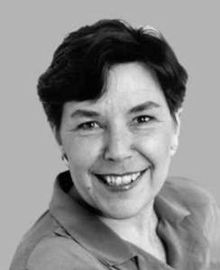Elizabeth Furse
Elizabeth Furse (born October 13, 1936 in Nairobi , Kenya ) is an American politician . Between 1993 and 1999 she represented the first constituency of the state of Oregon in the US House of Representatives .
Career
Elizabeth Furse, the daughter of British parents, was born in Kenya and grew up in South Africa . There she joined the movement against apartheid in 1951 . In 1956 she moved to England and then to the United States, where she settled in Los Angeles . There she supported a women's self-help group and a labor movement that fought for the right to join a union.
Furse moved to Seattle in 1968 . In 1974 she attended Evergreen State College ; In 1978 she moved to Portland , Oregon, where she began to study law. In her new home, she campaigned for the rights of the Indians and demanded the official recognition of the Indian tribes resident in Oregon. In 1986 she co-founded the Portland-based Oregon Peace Institute . Furse is also a co-owner of a vineyard.
Politically, Elizabeth Furse became a member of the Democratic Party . In 1992 she was elected as their candidate for the US House of Representatives, where she replaced Les AuCoin on January 3, 1993 . After a few re-elections, she was able to complete three legislative terms in Congress until January 3, 1999 . There she worked on improving diabetes prevention and treatment under the Medicare health program . In 1998 Furse decided not to run again.
After her time in Congress was over, Furse turned to her vineyard. But she is still politically active and supports the interests of the American Indians. In the Senate elections of 2002 and 2008, she supported the Republican Gordon H. Smith , with whom she is in agreement on the Indian question and who was one of the first within the Republican Party to support an end to the Iraq war. Elizabeth Furse is married to John C. Platt, who helps her manage the vineyard.
Web links
- Elizabeth Furse in the Biographical Directory of the United States Congress (English)
- Elizabeth Furse in the nndb (English)
| personal data | |
|---|---|
| SURNAME | Furse, Elizabeth |
| BRIEF DESCRIPTION | American politician |
| DATE OF BIRTH | October 13, 1936 |
| PLACE OF BIRTH | Nairobi , Kenya |

